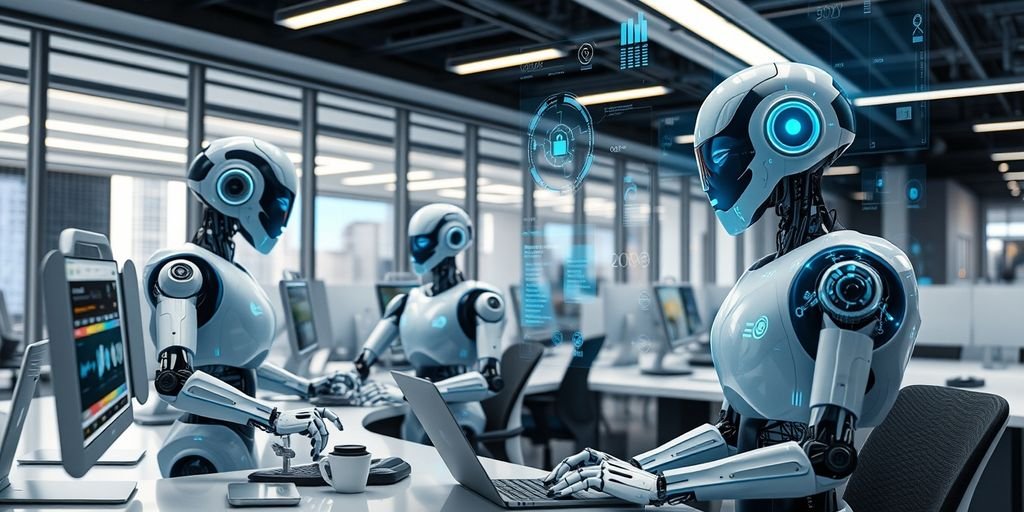Artificial Intelligence (AI) and Machine Learning (ML) are reshaping industries by introducing cutting-edge automation tools that are not only enhancing efficiency but also revolutionizing the way businesses operate. From marketing to software development, AI-driven automation is the newest trend that promises to streamline operations, foster innovation, and maintain a competitive edge in the market. In this article, we delve into the current trending tools in AI and ML, exploring their capabilities and how businesses can leverage them to optimize their processes.
Key Takeaways
- AI-driven automation tools are transforming marketing and software development by optimizing processes and enhancing decision-making.
- Emerging trends in AI, such as NLP and ML, are pivotal in creating more personalized and efficient business strategies.
- A hybrid model that combines AI automation with human expertise is essential for maintaining the necessary balance for successful implementation.
Revolutionizing Marketing with AI-Driven Automation Tools
Automated Writing and Editing: The Future of Content Creation
The landscape of content creation is undergoing a significant transformation, with AI-driven tools reshaping how marketers approach writing and editing. These tools, leveraging advanced algorithms and machine learning, are not only enhancing efficiency but also unlocking new creative potentials.
In the realm of automated writing, tools like Jasper.ai and Copy.ai have emerged as frontrunners. They excel in converting user inputs into well-crafted content for various platforms, from blog posts to social media updates. Grammarly’s sophisticated editing capabilities further refine the output, ensuring high-quality text that resonates with the intended audience.
- Content Automation and Storytelling Algorithms
- AI Generated Poetry
- Creative Writing Assistance
By automating the mundane aspects of content creation, AI allows writers to dedicate more time to the creative process, resulting in more engaging and impactful narratives.
The best AI content creation tools for 2024, as identified in recent trends, include ClickUp and Rytr, among others. These tools are not just about expediting the writing process; they are becoming indispensable collaborators in the journey towards innovative and personalized marketing content.
AI Automation for Streamlining Marketing Operations
In the dynamic world of marketing, AI automation is becoming indispensable for streamlining operations. Marketers are increasingly relying on AI to automate routine tasks, which not only saves time but also enhances the accuracy and consistency of their work. Automation tools are particularly effective in managing repetitive tasks such as data entry, email scheduling, and campaign management, allowing marketing teams to devote more attention to strategy and creativity.
The recent trend in the marketing industry leans heavily towards personalization and data-driven practices. AI tools are at the forefront of this shift, offering capabilities that range from precision targeting to enhanced personalization. These tools utilize machine learning algorithms to refine targeting strategies, ensuring that the right message reaches the right audience at the optimal time. Moreover, AI-driven insights are proving to be a boon for decision-making, helping marketers to identify trends and measure campaign effectiveness with greater accuracy.
The integration of AI in marketing operations is not just about efficiency; it’s about transforming the landscape of customer engagement and campaign management to be more responsive and insightful.
The benefits of AI in marketing are manifold, and they can be summarized as follows:
- Efficiency: Automation of repetitive tasks frees up time for marketers to focus on creative and strategic work.
- Precision Targeting: Machine learning algorithms refine targeting, reaching the right audience with the right message at the right time.
- Enhanced Personalization: Tailoring marketing messages to individual customers based on their past behavior and preferences.
- Improved Decision Making: AI-driven insights help marketers make informed decisions by identifying trends and measuring campaign effectiveness.
The Human-AI Hybrid Model: Balancing Efficiency with Expertise
In the rapidly evolving landscape of marketing automation, the human-AI hybrid model is proving to be a game-changer. This approach leverages the best of both worlds: the unparalleled efficiency and data processing capabilities of AI, and the nuanced understanding and strategic decision-making of human experts. As AI continues to drive the biggest trends in marketing automation, it’s clear that the synergy between human creativity and AI’s analytical prowess is reshaping the industry.
The integration of AI into hybrid work environments is not just about optimizing productivity; it’s about creating a symbiotic relationship where AI tools and human insight work in tandem to achieve superior outcomes.
Businesses that have embraced this model are seeing tangible benefits. They are able to respond more dynamically to market changes, personalize customer experiences at scale, and make more informed strategic decisions. Here’s a snapshot of the impact:
- Increased operational efficiency: AI handles routine tasks, freeing up human talent for complex problem-solving.
- Enhanced customer insights: Combining AI’s data analysis with human intuition leads to deeper customer understanding.
- Agile decision-making: The hybrid model allows for quicker adjustments to marketing strategies based on real-time data.
As we look at the major trends shaping marketing automation in 2024, it’s evident that the human-AI hybrid model is at the forefront. Companies that strategically integrate AI into their operations while maintaining a strong human element are setting new standards for success in the industry.
Transforming Software Development Through AI and Machine Learning
The Role of AI in Enhancing Development Efficiency
The integration of AI in software development is not just a trend; it’s a paradigm shift that is reshaping the industry. AI-powered tools and frameworks are now essential in automating repetitive tasks, enhancing productivity, and assisting with code generation and debugging. This automation is particularly evident in the realm of natural language processing, where AI is making significant strides.
AI’s role in software development is multifaceted, encompassing everything from project management to code optimization. Its impact is profound, offering a competitive edge to those who embrace its capabilities.
The benefits of AI in software development can be summarized as follows:
- Accelerated Development
- Enhanced Efficiency
- Cost-Effectiveness
- Expanding Horizons in AI
These benefits are not just theoretical; they are tangible and measurable. Companies that leverage AI in their development processes often see a marked improvement in their operational capabilities, making tasks less strenuous and more productive.
Impact of Machine Learning on Predictive Analytics and Decision-Making
The integration of Machine Learning (ML) into predictive analytics has been a game-changer for various industries, enabling more accurate forecasting and informed decision-making. The recent trend in the application of ML has seen a significant shift towards enhancing predictive models, which are now more sophisticated due to advancements in algorithms and computational power.
One of the key areas where ML has made an impact is in the analysis of large datasets. The ability to process and learn from vast amounts of information has led to the development of predictive models that are not only more accurate but also capable of identifying complex patterns that were previously undetectable.
The synergy between ML and predictive analytics is paving the way for a future where data-driven decisions are the norm, not the exception.
The societal impact of these advancements cannot be overstated. From healthcare to finance, the predictive capabilities powered by AI are transforming how organizations operate and interact with their customers. As we look to the future, it’s clear that the role of predictive analytics, underpinned by ML, will continue to grow, shaping a world where AI and ML are ubiquitous.
Navigating the Future: The Continuous Evolution of AI in Software Engineering
The integration of AI into software development not only accelerates project timelines but also improves overall code quality. As AI continues to evolve, it is redefining the collaboration between machines and humans, streamlining workflows, and boosting productivity within enterprises. The transformative role of AI is evident in the way it has become an integral component of modern software development workflows, automating tasks such as code generation, bug detection, and testing.
The convergence of AI, machine learning, and other emerging technologies is setting a new trajectory for software development. This evolution promises to revolutionize the industry, leading to more intelligent and efficient systems.
According to recent studies and expert predictions, the future of software engineering is poised for significant transformations. The proliferation of AI and machine learning is not just a trend but a paradigm shift that requires adaptability and innovation from software developers. While there are concerns about AI replacing certain aspects of software engineering, the current trend suggests a more collaborative future where AI tools augment the capabilities of human engineers, rather than replace them entirely.
Embracing the Future of AI and Machine Learning Automation
As we have explored, the integration of AI and machine learning automation tools is not just a fleeting trend but a transformative movement reshaping industries. From enhancing content creation to refining marketing strategies and revolutionizing software development, AI’s capabilities are expanding the horizons of what businesses can achieve. While these tools offer unprecedented efficiency and insights, it is crucial for companies to balance technological adoption with human expertise. By doing so, they can leverage AI’s full potential while preserving the irreplaceable value of human intuition and creativity. As we continue to witness the evolution of AI and ML, businesses that adapt and innovate will be the ones to thrive in this exciting era of technological advancement.
Frequently Asked Questions
How is AI transforming content creation in marketing?
AI is revolutionizing content creation by automating tedious tasks and fostering creativity, which saves time and keeps businesses competitive. Tools that leverage Natural Language Processing (NLP) can generate and edit content, allowing for more personalized and efficient marketing strategies.
In what ways does AI contribute to software development efficiency?
AI and machine learning are streamlining software development by automating repetitive tasks and enhancing predictive analytics. This allows developers to concentrate on complex problem-solving, leading to more efficient development processes and better decision-making.
What is the human-AI hybrid model, and why is it important?
The human-AI hybrid model combines AI capabilities with human expertise to achieve the best outcomes. While AI offers efficiency and data-driven insights, humans provide contextual decision-making and skills that AI cannot replicate. This model ensures that businesses can leverage AI tools effectively while maintaining the necessary human touch.



